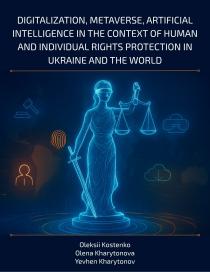A MATTER OF UNDERSTANDING DIGITAL RIGHTS
Synopsis
The paper demonstrates that digital changes in society call for a theoretical rethinking of traditional legal concepts and the creation of a legal mechanism to regulate, implement, and safeguard subjective rights and obligations of a natural person in a digital environment. The enjoying of individuals rights at the national and international level is directly impacted by digital transformation. An evolution of law is triggered by the emergence of a digital economy and the intensive development of digital technologies, which has already been expressed in the appearance of new objects of law, forms of law, ways of implementing the right, and so forth. The influence of digital technology is leading to the transformation of law, as evidenced by these events. As a result of digital transformation, individuals’ rights and duties as participants in the digital space are evolving. The study examines the emergence of new rights that are justified by the development of digital society. Such as: the right to digital identity, the right to privacy on the network, the right to be forgotten, the right to offline or the right to disconnect, the right to be informed about interaction with AI, etc.
The category of “digital rights” is used in the context of digital society and the digital economy. However, the meaning of this concept is not consistent. Digital rights are understood as universal human rights adapted to the conditions of the information society, in particular the right to privacy, the right to exchange information, the right to freedom of expression on the network, the right to access the electronic network. The term ‘rights to communicate’ or ‘rights to information’ is used to mean the same thing as ‘digital right’, but there is no clear distinction between them. The attempt to provide clarification between this definition are made in this paper.
The development of digital law is now underway to create a set of legislative acts that govern legal relations that are happening in the digital environment. The development of legal acts to handle digital things, the ethical use of artificial intelligence and big data, strict regulation of remote automatic identification of individuals by biometrics, and the growing importance of an anthropocentric approach in the use of technologists, etc. are all related to this process.
The proposal suggests that digital rights, which are subjective rights, should be perceived as a combination of property and non-property rights that safeguard a person’s capacity to operate in digital (virtual) space.










